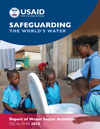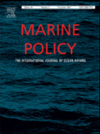-
The Invisible World Ocean Regime, and USAID’s 2015 Water Activities in Review
February 1, 2017 By Sreya Panuganti According to their recent Safeguarding the World’s Water report, the U.S. Agency for International Development (USAID) invested $499,995,179 in water-related programming in 54 countries in 2015. The agency’s fiscal year review details how it has attempted to improve water, sanitation, and hygiene (WASH) indicators, manage water for agriculture more sustainably, and improve food security. For example, the West Africa Water Supply, Sanitation and Hygiene project rehabilitated and constructed water sources for more than 65,000 people, trained 7,198 people on the gender-related dynamics of WASH, and established 203 women-led village savings and loan associations. In the Philippines, USAID helped communities adapt to weather variability and upgraded water infrastructure, improving access to drinking water for nearly 380,000 people. The report features additional project information for other regions, emphasizing the agency’s commitment toward “a water future defined not by scarcity but by security.”
According to their recent Safeguarding the World’s Water report, the U.S. Agency for International Development (USAID) invested $499,995,179 in water-related programming in 54 countries in 2015. The agency’s fiscal year review details how it has attempted to improve water, sanitation, and hygiene (WASH) indicators, manage water for agriculture more sustainably, and improve food security. For example, the West Africa Water Supply, Sanitation and Hygiene project rehabilitated and constructed water sources for more than 65,000 people, trained 7,198 people on the gender-related dynamics of WASH, and established 203 women-led village savings and loan associations. In the Philippines, USAID helped communities adapt to weather variability and upgraded water infrastructure, improving access to drinking water for nearly 380,000 people. The report features additional project information for other regions, emphasizing the agency’s commitment toward “a water future defined not by scarcity but by security.” In an article in Marine Policy, “SOFIA’s Choice,” Rafaella Lobo and Peter Jacques seek to disprove claims that marine policies today are significantly more focused on sustainability than in the past. By running each State of the World Fisheries and Aquaculture (SOFIA) report prepared by the UN Food and Agriculture Organization from between 1995 and 2016 through software, the authors measured the frequency of words falling into such categories as ecological, economic, social concern, science, food, and overfishing. Of the 87,000 relevant terms identified, words related to equity, gender equality, and justice only recurred a respective 76, 88, and 16 times over 20 years. Terms related to the concepts of “marine ecology” received only 19 mentions and “hunger” only 42. On the other hand, the authors identified 7,295 mentions of “production.” Based on this analysis, the authors argue that there is an “invisible, non-codified economic regime governing the World Ocean that is guided by the norms of sheer volume production.”
In an article in Marine Policy, “SOFIA’s Choice,” Rafaella Lobo and Peter Jacques seek to disprove claims that marine policies today are significantly more focused on sustainability than in the past. By running each State of the World Fisheries and Aquaculture (SOFIA) report prepared by the UN Food and Agriculture Organization from between 1995 and 2016 through software, the authors measured the frequency of words falling into such categories as ecological, economic, social concern, science, food, and overfishing. Of the 87,000 relevant terms identified, words related to equity, gender equality, and justice only recurred a respective 76, 88, and 16 times over 20 years. Terms related to the concepts of “marine ecology” received only 19 mentions and “hunger” only 42. On the other hand, the authors identified 7,295 mentions of “production.” Based on this analysis, the authors argue that there is an “invisible, non-codified economic regime governing the World Ocean that is guided by the norms of sheer volume production.”Sources: Marine Policy, U.S. Agency for International Development.
Topics: Africa, Asia, conservation, development, economics, food security, gender, meta, natural resources, oceans, Reading Radar, sanitation, UN, USAID, water
 A Publication of the Stimson Center.
A Publication of the Stimson Center.





